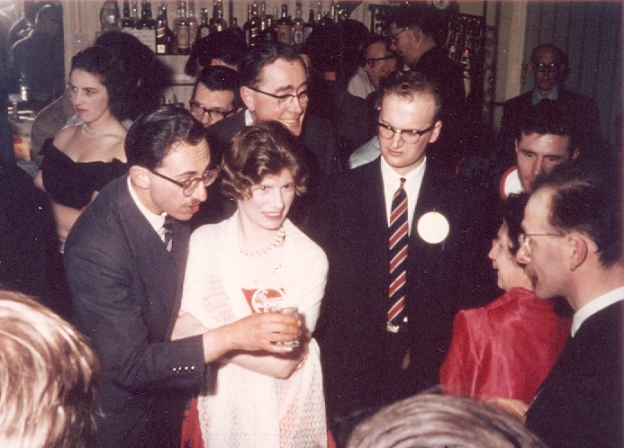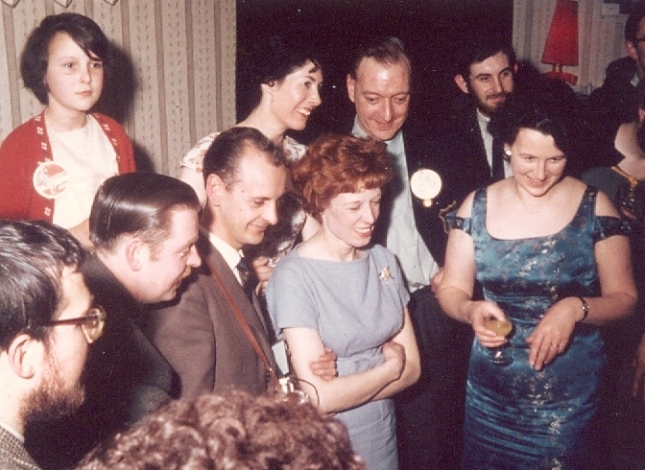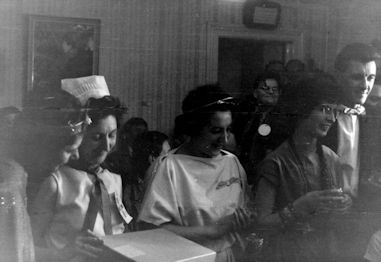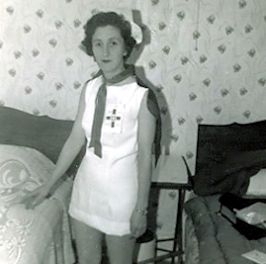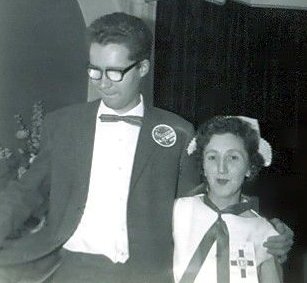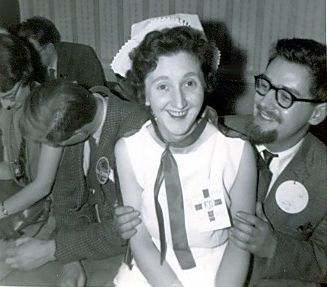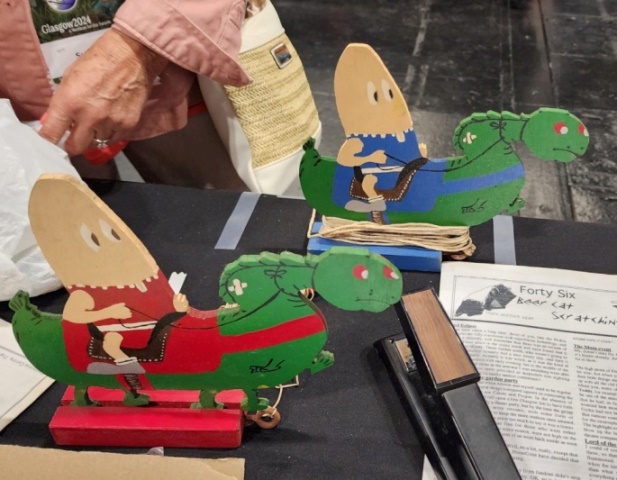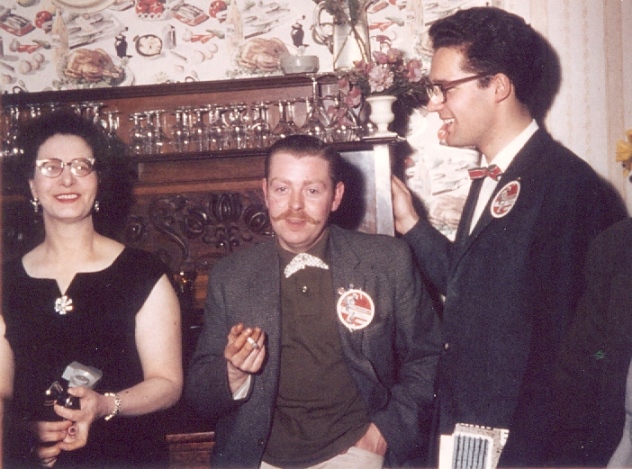Saturday 21st AprilJAMES WHITE:We got to Harrogate on two planes and a train. The first plane was crewed by three men and a girl all of whom we had seen with our own eyes eating fish sandwiches, and to anyone who has read or seen "Flight Into Danger" I need say no more. The second aircraft had nothing wrong with it *per se* or with its personnel, but it left without Walter and Ian's luggage. Nobly and with great personal bravery Walt offered to stay behind in rainswept Manchester for several hours until the missing luggage arrived - *Manchester*, several *hours* rain .." so that us young ones could get to the con without delay. We noticed that the train kept going slower the nearer we approached Harrogate, although this might have been a psychological thing. When Ian and I arrived eager and soaking wet at the West Park we thought for an awful moment that we were witnessing the final scene of a fannish "On the Beach." All the usual appurtenances of a con were present, the advertising posters, the "Ethel for Taff" notices the fan and pro artwork and Ken Slater's bookstall, but no people. It was like the beginning of a Don A. Stuart story before he became John Campbell; some brooding menace had obviously taken them all away. The first brooding menace we thought of was Burgess and we were examining this hypothesis in hushed tones when a voice, a human voice speaking English with a slight Californian accent, from behind us said: "Everyone is in the other hotel. You haven't been reading your programmes (pardon me, programs) gentlemen..." It turned out that the voice belonged to Ron Ellik, who went on to display his high intelligence and literary perception by saying that he liked the "Sector General" series. Later we were to discover that a fine brain beat behind that high, bespectacled forehead, although this was to be the first and only time that he referred to Ian and myself as gentlemen. RON ELLIK: I missed breakfast, of course, and expected to starve out the morning or find some coffee somewhere; surprised was not the word for me when Ella and Ethel Lindsay grabbed the landlord on his way through and demanded tea and rolls. He seemed startled that anyone should miss breakfast, but off he went and in jig time he was back with chow for an army. The three of us surrounded it.
That innkeeper was a fine fellow, by the way, name of Bert Harman, a personal friend of Bennett (in Harrogate nearly everyone knows Bennett); he broke his back making us happy for the weekend -- for instance, besides the extra breakfasts he made up without charge, when Dave Barber and I wanted cards Friday he got out a deck and made us a present of them; further, he was always interested in how the convention was going, how I was enjoying England, and like that. More of him later in this chronicle, to be sure. Some time before noon, I walked downtown with the Slater family -- Ken and Mrs. S., and eight-year-old Suzy. They were seeing the city, I was looking for flashbulbs; as it developed, I saw some of the city and they helped me look. Harrogate is a spa, possessed of some 88 mineral springs (chalybeate and sulphur), with only light industry to surround the tourist-focused activities which keep it going. The Stray, a huge public park and garden protected by act of Parliament from being built upon, fronts the main line of buildings and formed the scene for our walk to the business section, Suzy dancing ahead of us and swinging around tree-trunks.
On my return to Harrogate after Sheffield, Bennett and I discussed this oddly-named hamburger. Hamburgers are known in England and are nothing new -- but recently an American-style chain of Wimpy stands has sprung up. I can't explain why I saw them only in Harrogate, either, as Ron assured me they would be in London. Perhaps I wasn't too interested in eating hamburgers while in England. (Ellik calling Wimpy burgers "oddly-named" is a little surprising since I'd have expected everyone of that period to have heard of Popeye's hamburger-obsessed friend J. Wellington Wimpy - Rob) Leaving the Slaters, I investigated several photographic supply shops, and found they had no Kodak flashbulbs of the M type at all; all I could find as substitute was an F series that worried me -- they had glass bases, not metal, and I know too little about cameras to experiment. I decided to take available light only, and chance the results. you know who saw my slides at LASFS and New York this summer, many of my indoor shots were overly red, but almost all were properly lighted because of the versatility of Al Lewis' camera. Returning to the West Park, I reasoned from its emptiness that the programme must have started at the Clarendon. I went to my room to drop some things I had picked up and to change film, and bumped into two gigantic young gentlemen, each well over 6'3" tall, obviously looking for fans. "The convention is starting in the Clarendon," I said, whereupon they looked at one another in surprise. Just as I pondered what I had said wrong, they sprang upon me -- they had spotted my slovenly American accent instantly, and introduced themselves as James White and Ian McAulay of Irish Fandom. They were late arriving -- their luggage had not come through on the plane with them, and they'd finally had to leave Walt Willis to wait for the next plane. We talked about travel and my visit that week to Belfast as we strolled over to the other hotel, and I was in the unusual position of introducing these seldom-visitors to England to the few fans I could name.
RON BENNETT The Saturday programme began with a playing of a tape recorded by the BBC and belonging to Brian Aldiss of the Home Service programme THE REALM OF PERHAPS, a discussion on sf by Ted Carnell, John Wyndham, Brian Aldiss, Ken Bulmer and others. Following the tape long standing Nova writer E.R. James surveyed the sf scene, defining sf as having a basis of scientific fact explained logically. He claimed that Yoga thought of the concepts of science fiction long before sf did so. James amazed his audience by removing his jacket and standing on his head Yoga fashion. He spoke of the claims of Yoga and the manner in which Analog was using stories based on the off-beat sciences, and mentioned how to work even slight scientific concepts into stories. He wound up by reviewing his own sf history and the trends of sf during the last ten years. One major theme, he said, is that of overcrowding and survival. As one gets older one writes better, said James. One has a better insight into human nature and this is all important to writing. A short discussion followed, mainly on Yoga. Harry Harrison refuted the claims of the Eastern mystics, following research by Koestler, and Liverpool OMPAn John Roles defended James. Brian Aldiss introduced Tom Boardman, the Guest of Honour, mentioning man's first efforts at writing which were possibly on the lines of "mastodons crossing" or "back in ten minutes, lunch in caldron.". The first book was possibly religious (like sf?) and written in cuniform on baked clay tablets. This would have been difficult to interpret, rather like a fanzine. He spoke of progress made in publishing. Last year there were over 100 sf titles with much old reprint material because there is today a shortage of good SF writers in an age when there are great opportunities for writers who can think for themselves. SF, said Aldiss, is more than ever in the public eye. Only recently there was the Question in the House of Commons on Skyrack and Prime Minister Harold Macmillan. Actual examples, said Aldiss, included a coverage by "Vogue" and the BBC's "Realm of Perhaps." John Wyndham is selling regularly on the general market and sales for "The Day of The Triffids" is rivalling that of Agatha Christie. For years we have had to fight for a general acceptance of sf and now this has arrived. This year we had the first pocket books which had covers without the eternal bug eyed monsters chasing glamour girls. These are the Mayflower Sci-Fi series which have as their editor Tom Boardman.
Tom Boardman told his audience that surprised though they might be to discover it, publishers are trying to make money. Publishing is their living. He asked why hardcover publishers sold only two thousand copies of a book and yet would repeat the experiment, and answered his question by stating that often they are hoping to sell subsidiary film or reprint rights. Subsidiary rights are very important in the publishing world, said Boardman. He spoke of the rivalry to publish only good sf, though this itself is a danger, he said, to publishers. If more publishers jumped on the bandwagon the cake would be split more ways for buyers such as chain libraries would spread their orders and there would be less cash per publisher. One solution for a publisher appeared to be the paper back field. SF appeared to be a cast iron bet as a steady seller with usually fifteen to twenty thousand copies sold. How different from books like Ted Tubb's "Alien Dust" in the hardcover edition which sold only. one thousand. He spoke of his own experiences in editing paper backed SF, mentioning Penguin, Corgi, Panther and finally Mayflower. After his talk Boardman was asked questions on reprints under different titles, many members of the audience accusing publishers generally of underhand dealings and quoting examples. Boardman spoke of several different legitimate reasons for this common practice and also answered questions on the selection of material and commissioning writers to work to specifications. Altogether a most interesting and entertaining talk. JAMES WHITE: At the Clarendon the Guest of Honour, Tom Boardman, was addressing a hot, airless, crowded room-full of con members, and as we were far too hot already we stayed outside chatting with Ron, E.R. James, and a German fan called Thomas Schlück, and some other German fans whose faces I can remember but whose names I am afraid to spell. Why is it, I wonder, that foreigners can't have nice, simple, easy to pronounce names like Aloysious Xavier O'Herlihy instead instead of Tom Schlück? From what we could see Tom Boardman's speech must have been very good, because everybody was looking at him and not at Brian Aldiss kneeling in the upper half of one of the windows with his feet and hands pressed against the glass. It was said that he was trying to get the window open so as to let some air in, but my own feeling was -- judging by the odd, intent curvature of the spine and the juxtaposition of his various limbs -- that he had been successful in gnawing away some putty and was breathing through the crack between glass and sash.
Brian Aldiss is very resourceful and has ways of dealing with things like Ian McAulay, Spanish restaurants, and criticism regarding cobwebs to the Moon which are peculiarly his own. Later, when Tom Boardman had finished, I was privileged to witness him in action against Ian. It went something like this...
Ian: "Aldiss, what d'you mean having men with diode valves in their heads?" I can't remember exactly what Ian's reply was and, not wishing to give a false impression regarding his drinking, I have chosen to omit it. RON ELLIK: I was supposed to talk about MIT that afternoon, but things got a bit hectic in there when the speeches ran on towards dinner. Everybody wanted a break, and I was shuffled about to the next day, which didn't bother me a bit. During the afternoon sessions I met J. Michael Rosenblum, one of the nearly pre-historic British fans, sustainer of Britain's famous FUTURIAN WAR DIGEST throughout World War II when publishing fanzines was an almost impossible task. Mike is no longer the youngster described by Joe Gibson from a wartime meeting -- he is now a robust, cheerful businessman with a quiet, clear speaking voice and an interest in almost everything. More meetings: Brian Burgess of London, another towering giant, who reminded me of Bre'r Bar of the Joel C. Harris stories; Brian Aldiss, Hugo-award-winning Oxfordian who was helpful in my almost-meeting with Professor Tolkien; and -- surprise -- Eric and Beryl Bentcliffe, my hosts of two event-filled days earlier. Eric was wandering about with camera in hand, busy as a bird-dog and-happy to be actifanning again. It was pleasant to meet the Cheltenham crowd, too -- Eric Jones, with whom I used to correspond as early as 1952, and who turned out to be an alive, outgoing man and the sustaining prop of the Cheltenham SF Circle; Peter Mabey, the hard-working Librarian of the BSFA; and Audrey Eversfield, Bobbie and Bill Grey, and John Humphries. They made sure I was thoroughly invited to visit Cheltenham and somehow at about that point I found myself upstairs in the Clarendon losing a small fortune to John Roles and Ina Shorrock while Norman clucked at my eagerness for Brag. It wasn't until the next night (Sunday) that I began to win back my losings, a change at least partially due to that session in the Shorrocks' room, and Norman's comments about my playing. He has the most irritating manner of raising his eyebrows when I do something wrong -- a sure-fire teaching system. During the later afternoon I took advantage of a counter at one side of the assembly hall downstairs to set up with my camera taking fairly candid shots of many people intent on the programme. These shots with late afternoon lighting directly on the subjects were among my best -- particularly one of Mercer, full-face, looking rather startled as I call his name, snapping the shutter a breath later. Eventually the West Park inhabitants wound our way back to dinner; by this time Walt Willis had arrived from the airport, and I was privileged to meet him ahead of most other American fans by four months. He was tired and rushed from the hassle at the airport, and I don't recall him saying anything deathless that afternoon; as he and the other Irish fen were at the West Park, I saw much of them for the next day and a half, but as I was to visit Belfast the next weekend we naturally spent much of our time meeting others. The Irish boys are nearly as unfamiliar with English fandom as I am because they have attended very few conventions: Walt has been to two conventions in America, for example, and only three in the U.K. (Not so. Willis was at cons in England in 1951,1952,1953,1956, 1957 - Rob.) John Berry is an even wilder example -- he has never attended a British con, and the only ones who have met him are those fen who've visited Belfast; but he's an extreme, and Walt, James and Ian certainly knew their way about.
JAMES WHITE: During the part of the programme when everyone was supposed to be out seeing Harrogate, everyone wisely stayed inside - it was raining buckets, and buckets are even more painful than cats and dogs when they fall from a great height. I met Ethel Lindsay again, one of the nicest people I know even when she isn't heaping me with egoboo. And Ella Parker, who is something with which my four-letter alien classification system is not equipped to deal. When Ethel introduced us I was particularly impressed by the way she said "I've heard about *you* ..!" and while still holding my hand twisted part-way up my back went to greet Ian with "You stinker!" to which Ian replied "Aaargh!" There have been times in the past when I have thought that there might be something between Ian and Ella. I've seen him get suddenly flustered when her name came up in conversation, seen his face redden and generally act as if he was in the grip of some strong emotion. He had spoken of her in somewhat derogatory terms, of course, but we all know how love is akin to hate. Bearing in mind the fact of his approaching nuptials in July I had come to Harrogate expecting to see Ian take a tender, noble farewell of Ella like the lovers parting in "Prisoner of Zenda" only more sloppy -- but I must say that nothing like this happened at all.
All during the afternoon the rain beat at the hotel windows, but inside, to me at any rate, the script was straight out of Kubla Khan -- sweet words and soft music all the way. The music dealing as it did with my many fine qualities as a writer and my extreme modesty as a person, was repetitious but never boring and the libretto contained such thoughtful, perceptive passages as "The Sector General series is the *greatest*, man" and "You *must* continue the series, please, Mr. White" and "Are you a medical man yourself, Mr. White, the technical details ..." When I'd read the blurb on the advance copy of Ballantine's HOSPITAL STATION where they had said that I could only be compared with Hal Clement I'd thought that my cup had run over until it filled the saucer but the way egoboo was pouring in it looked like flooding the whole tea-tray, I was getting so much egoboo even I began to feel that it verged on the vulgarly ostentatious, and after one particularly pleasant chat with one of my public -- a girl who just *adored* my stories and whose husband, who didn't read s-f at all but promised to try some now that he had met an author -- Ian asked me in somewhat withering tones if I was enjoying the Con so far? I ignored the sarcasm, because I was feeling very good just then, and instead offered to buy him a drink. He refused it. There are many people, particularly those who may have been at or been influenced by reports from last year's Con, who will doubt the veracity of that statement. They will say that it is not only impossible for such an event to occur it is completely ridiculous. But Ian Ross McAulay did on the afternoon of Saturday 21st April at approximately 17.15 hours, refuse a drink. I can even recall the actual words used in his refusal, which were, "I've only *got* two hands, mate!" Shortly after this Brian Aldiss, Harry Harrison, Margaret Manson, Walt, Ian and myself suddenly found ourselves in the same corner of the room thinking the same hungry thoughts. As it was still raining Margaret offered to drive some of us to a restaurant for dinner in her two-seater car. The car is fairly roomy for a two-seater, and Brian insisted that everyone would fit in it. Everybody very nearly did, too. Then Walter elected to walk to the restaurant so that the rest of us could ride. To me this proved the inherent nobility of the man and also, I think, his instinct for survival. In his younger days Walt was once run over by a bus, and at one stage there had been some talk about breaking his and Harrison's legs to make them -- Walt and Harry, that is, not their legs -- fit into the boat. I was sitting in front beside Margaret Manson, who was driving, and thoroughly enjoyed the trip. The only odd thing I noticed about it was the way our headlights seemed always to illuminate the base of the rain clouds rather than the street ahead. Brian, Ian and Harry, however, kept grumbling all the time about not having room to breathe and then proving that they could by going into long, grisly descriptions of their internal injuries. The moment we walked into that Spanish restaurant I had the feeling that we were not wanted. It was something about the way the patrons looked, at us, I think, we were obviously so full of life and witty conversation, happy, well-adjusted, while they ... Well, the reminded me of a tin of biscuits once seen after, it had been dropped from a third-floor window -- outwardly polished and shining but all twisted and broken up inside. They also ran heavily to green suits with red beards or dinner jackets with the obsolete DB-lapels and lines of asceticism or maybe ulcers around their mouth's. Our own party was dressed with casual elegance -- Brian in a dark bronze shadow check number which made me feel envious, Ian in sober charcoal grey with a yellow sweater, which denotes that he is a physicist and not an advertising executive, Harry Harrison in a hand-woven Harris tweed jacket of excellent cut and possessing extremely long-wearing properties -- I recognised it from the Worldcon in '57; and Walter and I (who patronise the same tailor, me) elegant in casual but well-cut tweeds. Margaret looked terrific, but as I don't touch Ladies I am unfamiliar with the terminology to describe her outfit. The patrons had, therefore, no right to raise eye-brows at our dress nor could they object to our conversation, which was quite clean and moreover scintillated as only can Con conversations between people who have been saving up their best and worst puns for years and don't want to waste a second of talking time. On reflection I think maybe it was the puns which made them not like us. The waiter who came forward also showed that we weren't wanted, although in a more polite way, by refusing to speak anything but Spanish at us. But by some strange coincidence we happened to have two Spanish speakers with us, Margaret and Harry, and he retreated towards the kitchen to further register his disapproval by making us wait, a long time for our huevos revueltos. Considering the fact that I hadn't had anything except three potato crisps given me by an admirer at three o'clock, to eat since leaving Manchester seven hours earlier, I thought my eating with just one knife and fork showed commendable restraint.
RON ELLIK:
Saturday night was the fancy dress ball, highlighted by a number of events reminiscent of the Variety Show at the Pittsburgh Convention. To start it off somebody bought me a drink and dealt me three cards and I learned some more about
Brag. That was broken up shortly, though, by Ella who wanted me to meet Terry Jeeves; Terry and Val had to shout at me by then, though, for the Gerry Poole trio had started up in a corner, and the party was really warming. They shouted hello and I shouted hello back, and they roared an invitation to visit them in Sheffield after the convention, and I cheerfully bellowed back acceptance, just as Bennett came up and informed me that the panel of judges was supposed to have an American on it to lower the standards of judging. I contemplated slugging him but as I set my glass down someone filled it; so I picked it up and elbowed my way through the dancing crowd to where my fellow Areopagi sat.
We had fun judging that group; the costumes were few, and Ethel Lindsay agreed with me later at Chicago that they were less spectacular than the American costume parties, but choosing from among them offered some interesting problems
-- for one thing, we had to invent categories as we went along. Mr. & Mrs. Boardman and Harry Harrison were the other judges -- Bennett had stuffed it solidly with Americans. As the monsters and girls paraded before us we talked and judged intermittently, taking our own time about it; and when we finally handed out the lavish prizes (Bennett out-did himself there, believe me) we pleased everyone and were well satisfied with our work.
And the noise level continued rising.
RON BENNETT
The Fancy Dress Party on the Saturday evening, was extremely ably compered by Cheltenham's Eric Jones, supported
by music from the specially imported Gerry Poole Trio. With the theme of the fancy dress A.D. 2062 prizes were
won by Sector General Nurse Ethel Lindsay, Traffic Warden Wally Johnson, Angel Jill Adams, Mutant Tony Walsh, and
Hobbit and Strider Ken Cheslin and Susie Slater. Phil Rogers ran a book on a horse racing game which raised hopes
of backers and fifteen shillings for the convention and Ron Bennett sidestepped a conga line which spread into the
hotel's public bars to down the first glass of sulphur water - rigged of course (I live here) - in the spa-water
drinking contest. Contestants were John Roles, Brian Jordan and Horst Margeit. Roles quickly retired and Jordan
finally won. It is understood that when he recovers he will inform us as to the quantity drunk.
RON ELLIK:
I don't know whether those waters were chalybeate or sulphur, but Norman Shorrock and I tasted a wee drop and agreed
roundly that they'd have to catch us and throw us before we'd enter that contest. We watched and I worked the camera
while Brian Jordan won by downing perhaps twelve ounces of the vile fluid, leaving his nearest competitor half a cup
behind, spitting and grimacing horridly. Jordan was carried insensible from the room, uttering weird sounds; he should
be available for comment within the sixmonth.
Right after the spa-water drinking contest I tried to have a word with Harry Harrison about American fandom; we actually
did exchange a few phrases, at the top of our vocal ranges, but the music had started up again, and a conga line began.
I was invited to join in right behind Ina Shorrock, and no gentleman could resist being in a conga line behind Ina
Shorrock; the wildly swaying crowd of over two dozen fans wound its way about the hall, upsetting the remains of the
Brag game and overturning tables, and suddenly the leader decided it was stuffy and we were bumping and singing through
the lobby of the West Park, and I forget what happened between then and the party in the Parker-Lindsay room around two ayem.
JAMES WHITE:
Meanwhile back at the West Park a Fancy Dress party had been going on, and after severing diplomatic relations with the
Spanish restaurant we joined it. Here Ethel Lindsay, bless her long white cotton socks, bestowed upon me the ultimate in
egoboo by winning the Fancy Dress contest, as one of my characters. I decided there and then that this was the best con
I had ever been at. Nothing, even the smell of the Harrogate water which John Roles, Horst Margeit and Brian Jordan were
quaffing; in an attempt to win death and/or
glory in the spa-water drinking contest, made me change my mind.
KEN CHESLIN:
Some time later, when things had quietened down a little someone produces four mad little Soggy type characters on
horses, carved out of wood and painted in a most delightful manner. With this set of riders it was proposed to have races, and we did.
The riders and beasts were mounted on small stands of wood, string was attached to the front of them and they were then
dragged across the carpet towards the controlling fans. If a mount-and-rider fell over it was disqualified. With Ron
Bennett and Phil Rogers working the tote, and four new fans each race hauling the pieces, a wonderful time was had by all.
JAMES WHITE:
About the same time someone came up and started developing the argument that aliens in s-f weren't truly alien, that authors cheated
by making them so very human when they should have been making them unhuman with completely alien motivations and thought processes.
He said that Hal Clement and I were serious offenders in this respect. I thought that this was the second time that I had been
compared with Hal Clement, and what a really good con this was. At the moment I can't remember this critic's name, only that he was
an Oxford man, sensitive, intelligent and a mean climber of drain-pipes.
There was a certain amount of alcoholic drink at Ethel and Ella's party that evening. They had stocked up more than adequately and
I had helped Ian bring in some beer -- each of us taking an end while bringing the crates from the van downstairs to the room. On
entering the party Ian displayed no signs of inebriation, although I had seen him holding a glass in his hand for hours, or sometimes
two glasses. However, as all glasses look similar -- sort of shiny and transparent and with brown stuff slopping about inside -- I
would not like to say that he drank continually all day. However, to scotch once and for all the rumour that Ian is a compulsive
alcoholic I decided to count the beer he took.
Approximately three point two five seconds after entering the room he had his first beer, to be sociable, he said. This was at ten-thirty.
At ten-fifty three I made it six beers. At eleven-five it was nine beers, and counting. Eleven-twenty came and it was thirteen, and holding.
Apparently somebody had pinched his glass when he had been in the process of re-distributing his mass on the bed to let Walter take his
elbow out of Ella Parker's ear. A substitute receptacle had been discovered nearby, but Ian refused to use it on aesthetic grounds. Finally
Ethel saved him by producing a plastic tooth-glass.
The count resumed.
At seventeen and counting I made a pun and Ella threw a whiskey bottle at me. It was an empty bottle -- she knows I don't drink -- and it
missed. Then she kicked me out of bed, her reason being that I was giving her a cramp in the leg as well as a pain in the neck. So I moved
to Ethel's bed which just had Ethel, Ron Ellik, George Locke, Archle Mercer, and part of Brian Aldiss on it. Here Ethel gave me three whole,
full bottles of tomato juice. All this caused me to lose count.
I am very sorry about this as I was and still am anxious that no exaggerated rumours should be noised abroad regarding Ian's drinking, but
I must admit that there is a fairly high probability that between the hours of twelve midnight and four o'clock when the party broke up he
had another beer, maybe even two. However the facts as we *know* them, verified by a sober, unbiased observer name of myself, are that
between ten-thirty and twelve he had a very moderate seventeen beers. Any count made after this time is sheerest conjecture and should be
discounted as such.
I can also state that, although the clarity of his speech left something to be desired at times -- this was due to southern Irish environmental
influences rather than beer -- the incisive clarity of his intellect remained at all times unimpaired.
RON ELLIK:
I mentioned earlier that Liz Humbie had tried to get root beer at the U.S. base near Harrogate; she had failed. She was abject, she was
frightened, she was mortified -- but I forgave her, because I was getting a bit scared that everywhere I went my hosts would have heard
of my taste in soft drinks and stocked up on root beer. Fortunately I was guaranteed that her strongest efforts weren't good enough --
and, of course, that cinched it.
So I wandered into Ella and Ethel's room, and Ella leaped up, elbowed the Brag players out of the way, and opened one of two CASES of
Hire's Root Beer, in tins.
I was astonished.
The explanation was simple enough: Ajax Hoch, that sneaky-American stationed at the same base, had civilian canteen privileges; Liz, as
a British national, had none. He and Ella had contrived to surprise me and hadn't thought to tell Ron or Liz. Ella watched in glee as I
chugalugged a can of brown carbonate, and then announced that, finally, she would let someone else try some. The room full of adventurous
souls didn't exactly crush me in their press to this strange drink -- especially when I told them it wasn't alcoholic -- but my careful
eye found about 50% favourable reaction among those who did try it. Ella, for instance, hates the stuff and insisted that I wasn't worth
the trouble and should be made to drink all of it, right then; but Ian McAulay and George Locke rather liked it. Dave Barber says no
respectable man would drink anything like that and try to play Brag.
Sitting on a small segment of one of the beds, I spent much of the night talking to McAulay, James White, Ted Forsyth and Peter Mabey.
Ian and James were curious about my mathematical abilities -- Ian is a physicist from Trinity College in Dublin, and James adopts the
pose of a curious observer. It seems that all of Irish fandom was interested in relativity, because Ian had tried to explain Einstein's
concept of the four-dimensional universe to Berry and failed.
They told me Berry refused to accept relativity until Andy Young, far-wandering astronomer, had happened to be in Belfast and told him
the universe was shaped like Marilyn Monroe. Berry immediately brightened towards this visualization, and decided to undertake a life-time
study of relativity in order to find out what part of the universe he was standing on.
Walt claimed to have defeated Ian in a physical sciences type argument by deductive logic, and Ian turned to me for help. "You are a
mathematician," he proclaimed, "and mathematics is the servant of the sciences."
"And the queen," I insisted. "Eric Temple Bell says it's the queen and servant of the sciences. Yes."
"Well, queen and servant, then, but you admit it's the servant. What I want you to do, servant, is help me get out of this pickle with
Walter, who wants me to explain --" and so help me, gentle reader, that was at three in the ever-loving morning, and I can't for worlds
recall the problem Walter and Ian were having. All I recall clearly is that I considered the problem with a furious grimacing and wiping
of my glasses, stared hard at Willis and harder at Ian, then turned quickly about and glowered at Liz Humbie, who cowered from me. Then
I grimaced some more, muttered under my breath, and made my pronouncement.
"There is a simple, decisive answer to your dilemma," I said. "You stop relying on physics, and turn to logic and rhetoric, remembering
that the true scientific method is eclectic and shuns no discipline where it may aid the advance of certain knowledge. And you tell him
to define his terms."
Having spoken, I had to sit still while Walt roared in anguish -- it seems he hadn't really known what he was talking about, almost as
much as Ian hadn't known what he was talking about.
Somebody asked me if I was so smart, what was a Klein bottle, and I told him it was a bottle with its inside on the outside and both of
them the same side, sitting on its top, and able to hold a liquid. That brought James White up short, and he stared incredulously while
I attempted a detailed hand-waving description which was interrupted by Willis bellowing "Define your terms!" every few minutes. Amazingly,
I think White understood when I was through.
JAMES WHITE:
Ethel, Ian, Walt, Ron Ellik, George Locke and myself were on Ethel's bed - - the party had begun to thin out by that time -- discussing
the existence or non-existence of the square root of minus one, and Ian was with it. For all of three minutes he had me seeing the square
root of minus one as a living, breathing thing instead of a piece of mathematical sleight-of-hand. (Other people in the room were no doubt
seeing things, too, but the square root of minus one isn't pink). From there I steered the conversation into less esoteric channels by
asking a question which had been bothering me for some time, namely how, if Space is curved, even negatively, in the fourth dimension is
it not possible for a person travelling far enough to return to his starting point?
There was silence in our bed for a few minutes after this. Ron, who is very clean cut and intelligent, looked slightly fuzzy -- nine cans
of root beer by two-thirty -- and pensive. Then suddenly his eyes lit up. Obviously he had the answer, or at least an out. With throbbing
voice and flashing spectacles he demanded, "What is Space, what is curvature, what is a person? *Define your terms!*"
RON ELLIK:
And then Dave Barber and Sid Birchby (I think) taught me nine-card Brag, which is in my estimation an extremely expensive game with no
fun attached. It seems you get to pay sixpence for nine cards from which you assemble three Brag hands and you start betting to out-Brag
your opponents' three hands. After I tired of giving Barber my shillings, I talked to Bill and Roberta (Wild) Grey about Arthur's grave
at Glastonbury which unfortunately wasn't on my itinerary, and then I spent an extremely interesting hour or so talking the international
fan scene over with Forsyth and the busiest fan librarian in the world, Peter Mabey.
The BSFA and the N3F started to get in communication with each other a couple of years ago, but I guess it just wasn't time for the idea
then. At one point there was a new set of BSFA officers elected and no word about the N3F was passed on. We decided to talk about this
with the entire BSFA slate the next morning after the Annual General Meeting, and at some time near dawn I found I wasn't looking at Mabey
but at the inside of my eyelids. I sought my couch, grateful for the electric blanket.
|

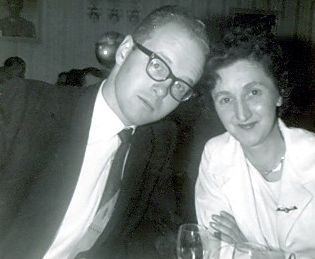
 It's a small town of approximately 60,000, and combined crowded,
old-fashioned buildings with more modern department stores and restaurants. It sports a large J. J. Newberry's -- incredibly American, with the prices all in sterling being the only difference -- and a food I've never seen elsewhere: the Wimpy.
It's a small town of approximately 60,000, and combined crowded,
old-fashioned buildings with more modern department stores and restaurants. It sports a large J. J. Newberry's -- incredibly American, with the prices all in sterling being the only difference -- and a food I've never seen elsewhere: the Wimpy.

